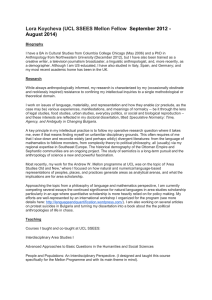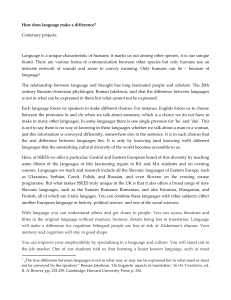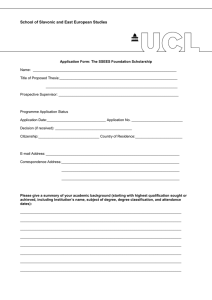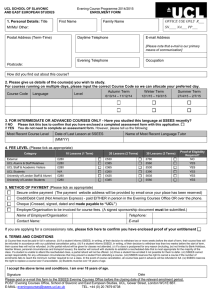Document 12964097
advertisement
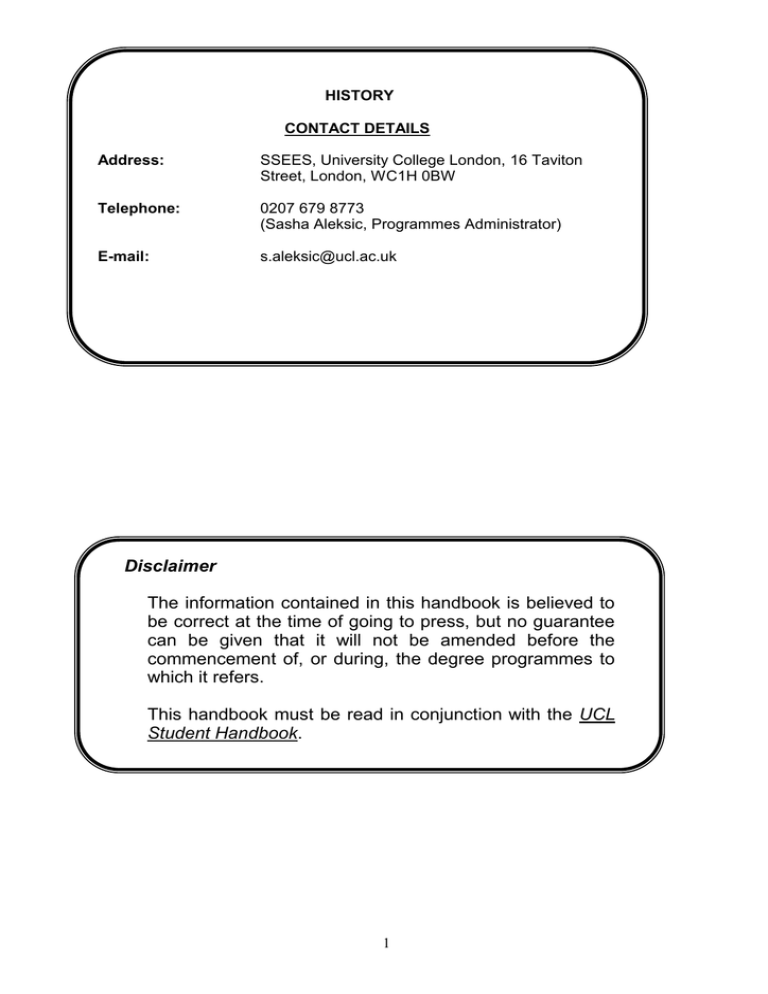
HISTORY CONTACT DETAILS Address: SSEES, University College London, 16 Taviton Street, London, WC1H 0BW Telephone: 0207 679 8773 (Sasha Aleksic, Programmes Administrator) E-mail: s.aleksic@ucl.ac.uk Disclaimer The information contained in this handbook is believed to be correct at the time of going to press, but no guarantee can be given that it will not be amended before the commencement of, or during, the degree programmes to which it refers. This handbook must be read in conjunction with the UCL Student Handbook. 1 CONTENTS Page 3 The Course-Unit Degree List of SSEES History Course-Units 5 Degrees in History 6 Syllabus 7 Regulations & Schemes for the Award of Honours 11 KEEPING US INFORMED You must ensure that your personal details on the Portico system, including changes of address, telephone and e-mail accounts, are kept up to date. We may need to contact you urgently – for instance, about a sudden change in an examination venue, or a change of class. 2 THE COURSE-UNIT DEGREE What is a Course-Unit Degree? A course-unit degree is built up over three years of study. Instead of sitting eight or nine final examination papers at the end of the course of study, students are examined at the end of each year, in the subjects taken during that year. What is a Course-Unit? A course-unit is a clearly defined course of study - defined in terms of content, workload, hours of attendance, and assessment. As a rough guide, a course requiring 40 hours of attendance will be worth twice as much as a course requiring 20 hours of attendance. However, subjects differ in their content and thus requirements may differ too (language courses in particular often demand more contact hours than other courses). Students take four course-units each year. Some courses are worth a full unit; others a halfunit. The course-units provided by the SSEES History Programme are divided into groups as follows: Foundation “Core” Courses These courses are available only in the first year. 'Seminars in History', 'Modern Historiography' and ‘World Histories’ are compulsory. These courses are intended to introduce you to the concepts, skills and major developments in the study and writing of history. All foundation courses must be passed in order to progress into Year Two, and are marked numerically, but they do not contribute to overall degree classification. Compulsory First-Year Course In addition to the Foundation “Core” courses, ‘Eastern Europe Since 1856’ is compulsory for all first-year students. Performance in this course may be taken into account in determining overall degree classification. Group 1 History Courses Group 1(a) History courses generally provide an overview of a large geographical region and/or a long time span. These courses are mainly taught over two terms by a combination of lectures and discussion classes. Classes may be led by the main course tutor, another member of staff or a postgraduate teaching assistant. Group 1(b) History courses are worth one half-unit. They offer an opportunity to study a particular area or theme, often within a more limited time-span. Group 1 (a and b) courses are not available to first year students. Group 2 History Courses Group 2 History courses form the compulsory component for Year 2 students, but can also be taken by final-year students. They are not available to first-year students. They are taught over two terms and are worth one course-unit. Group 2 courses cover specific historical topics in more detail than Group 1 courses. 3 Group 3 History Courses Each single honours student takes one (and only one) Group 3 History course in their final year. They are worth two course-units. Previously known as Special Subjects, they examine an historical topic in detail using primary as well as secondary sources. Group 3 courses are taught over two terms. Year Abroad (for those on the History with a Year Abroad degree) During your year abroad you will sit courses (in English) relevant to your degree. Please refer to the relevant SSEES Year Abroad Handbook for further information. 4 LIST OF SSEES HISTORY COURSE-UNITS The following History courses are offered at the School of Slavonic and East European Studies, but students may take courses at other colleges of the University in their second and third years of study. Course descriptions for all the courses listed below can be found on the SSEES web site. Foundation “Core” Courses (first year only) Seminars in History Modern Historiography World Histories 0.5 cu 0.5 cu 1.0 cu Compulsory First-Year Course Eastern Europe Since 1856 1.0 cu Group 1(a) History Modern Germany 1815-1990 History of Russia to 1598 Society and Politics in Late Imperial Russia Dictatorship as experience: The coexistence of consensus and refusal in the German Democratic Republic 1.0 cu 1.0 cu 0.5 cu 1.0 cu Group 1(b) History Between Politics and Culture: German Ideas 1890-1970 Themes in Romanian History: ‘From Dacians to Democrats’ The Balkans from Empires to Nation States The Age of Extremes in the Balkans History of the Soviet Union Society and Politics in Late Imperial Russia Czechoslovakia in the Age of Extremes, 1918-1993 0.5 cu 0.5 cu 0.5 cu 0.5 cu 0.5 cu 0.5 cu 0.5 cu Group 2 History The Rise and Fall of Yugoslavia 1918-1991 Successors to the Habsburgs: East-Central Europe 1914-1945 The Fall and Rise of the Polish Nation 1648-1921 Short Taught Dissertation With Coursework 1.0 cu 1.0 cu 1.0 cu 1.0 cu Group 3 History Ivan the Terrible: the Russian Monarchy in the Sixteenth Century Urban Culture and Modernity: Vienna-Prague-Budapest 1857-1938 Mass Culture in the Age of Revolution: Russia 1900-1932 5 2.0 cu 2.0 cu 2.0 cu DEGREES IN HISTORY BA HISTORY AND BA HISTORY WITH A YEAR ABROAD General Both SSEES History degrees cover the history of Europe as a whole, but particular importance is attached to the study of the areas with which the School of Slavonic and East European Studies is primarily concerned: the countries of Central, Eastern and SouthEastern Europe, including Russia and Germany. Students entering for the degree will be required to complete twelve course-units to be taken over three years for BA History and sixteen course-units to be taken over four years for BA History with a Year Abroad. Students are allowed a wide choice of course-units, but by the end of their course of study they must have studied overall a minimum of seven units in History, including a Group 3 Special subject in their final year, and at least 1 course-unit from Group 2. A minimum of four course-units must be taken from the list offered within the SSEES History programme, not including, foundation “core” courses. Students may take certain history courses offered by the History Department of UCL or taught in other colleges in the University of London, as well as certain social science, humanities and language courses taught at SSEES. For those students on the History with a Year Abroad degree, it is strongly recommended to develop your language skills in Year 1 and Year 2 in the language relevant to your study abroad. Restrictions also apply in respect of students taking a language course in a language with which they are already familiar. Completion of Courses Failure to complete coursework or to fulfil other course requirements without appropriate explanation will automatically result in debarring from the examination and thus in failure of the relevant course unit or half-course unit. All assessed coursework, including orals and any other task set, as part of your assessment, must be submitted in order for the coursework to be completed. All Foundation courses (Seminars in History, Modern Historiography, World Histories) must be satisfactorily completed in order to progress to Year Two. 6 BA HISTORY SYLLABUS 2015-2016 YEAR 1 Foundation Core Courses: Seminars in History (0.5 cu) Modern Historiography (0.5cu) World Histories (1.0 cu) Compulsory: Eastern Europe Since 1856 (1.0 cu) One or Two from the following (to the value of 1.0 cu): (Subject to Availability) An approved course in another discipline, including a language course (1.0 cu or 2 x 0.5 cu) YEAR 2 Compulsory: Group 2 History paper at SSEES or another college* (1.0 cu) Plus three course-units, from: Group 1(a) or 1(b)*** History papers SEES2101 History of European Political Ideas SESS2012 Economic History and Ideas Approved History paper at another college* Language courses (up to 1.0 cu) (see page 6) An approved course in another discipline (up to 1.0 cu) YEAR 3 Compulsory: Group 3 History paper either at SSEES or another college* (2.0 cu) Plus two course-units from: Group 1(a) or 1(b)*** History paper Group 2 History paper* SEES2101 History of European Political Ideas SESS2012 Economic History and Ideas Approved History paper at another college* Free-standing dissertation1 (10,000 words – refer to Study Skills Handbook) Language Level 2 or above (up to 1.0 cu) (please see local rules) An approved course in another discipline (up to 1.0 cu)** 1 The ‘free-standing’ dissertation is available to undergraduate History students in their final year of study. It is not taught as part of a course. Instead, students select a topic in East European history and are assigned an advisor. The advisor will give initial help with the framing of the title and with a bas ic bibliography. The advisor will also give assistance as requested and as he or she is competent to advise. It is, however, the student’s task to compose structure and write the dissertation. The advisor will not comment on preliminary drafts. As the free-standing dissertation requires considerable independent study and takes place outside a classroom context, only students who have obtained a solid and overall 2.1 mark in their second-year papers will normally be permitted to undertake this unit. The free-standing dissertation is a full unit. It should normally be submitted as a bound document in two hard copies by no later than the first day of the final term or 1 May, whichever is the sooner. The dissertation should be longer than 10,000 words, including footnotes and appendices, but not including bibliography. It should follow the advice on how to write a dissertation given in the departmental Study Skills handbook. 7 * Approval to take papers at another college depends on prevailing intercollegiate arrangements, acceptance by the other college, and the effect on the overall degree profile. ** Please note that finalists may not take introductory/basic level courses in their final year *** Remember that Group 1(b) courses are worth 0.5 cu. Please note: some courses are inevitably oversubscribed. Alternatively, some courses have so few takers that they are not considered to be worth running. These constraints mean that your course choices cannot be guaranteed. In selecting course options it is always advisable to include SSEES courses as, at least, reserve choices. 8 BA HISTORY WITH A YEAR ABROAD SYLLABUS 2014-2015 YEAR 1 Foundation Core Courses: Seminars in History (0.5 cu) Modern Historiography (0.5cu) World Histories (1.0 cu) Compulsory: Eastern Europe Since 1856 (1.0 cu) One or Two from the following (to the value of 1.0 cu): (Subject to Availability) An approved course in another discipline, including a language course (1.0 cu or 2 x 0.5 cus) YEAR 2 Compulsory: Group 2 History paper at SSEES or another college* (1.0 cu) Plus three course-units, from: Group 1(a) or 1(b)*** History papers SEES2101 History of European Political Ideas SESS2012 Economic History and Ideas Approved History paper at another college* Language courses (up to 1.0 cu) (see page 6) An approved course in another discipline (up to 1.0 cu) YEAR 3 Compulsory: SEYA3002 School of Slavonic and East European Study Abroad Project (1.0 cu) Either: SEYA3001 SSEES Year Abroad Year Shell Units (Full Year) SEYA3003 SSEES Term 1 Shell Units SEYA3004 SSEES Term 2 Shell Units (3.0 cu) (1.5 cu) (1.5 cu) For further information please refer to the relevant SSEES Year Abroad Handbook YEAR 4 Compulsory: Group 3 History paper either at SSEES or another college* (2.0 cu) 9 Plus two course-units from: Group 1(a) or 1(b)*** History paper Group 2 History paper* Approved History paper at another college* Free-standing dissertation2 (10,000 words – refer to ‘Study Skills’ Handbook) SESS2101 History of European Political Ideas SESS2012 Economic History and Ideas Language Level 2 or above (up to 1.0 cu) (please see local rules) An approved course in another discipline (up to 1.0 cu) ** * Approval to take papers at another college depends on prevailing intercollegiate arrangements, acceptance by the other college, and the effect on the overall degree profile. ** Please note that finalists may not take introductory/basic level courses in their final year *** Remember that Group 1(b) courses are worth 0.5 cu and must be taken in pairs. Please note: some courses are inevitably oversubscribed. Alternatively, some courses have so few takers that they are not considered to be worth running. These constraints mean that your course choices cannot be guaranteed. In selecting course options it is always advisable to include SSEES courses as, at least, reserve choices. 2 The ‘free-standing’ dissertation is available to undergraduate History students in their final year of study. It is not taught as part of a course. Instead, students select a topic in East European history and are assigned an advisor. The advisor will give initial help with the framing of the title and with a bas ic bibliography. The advisor will also give assistance as requested and as he or she is competent to advise. It is, however, the student’s task to compose structure and write the dissertation. The advisor will not comment on preliminary drafts. As the free-standing dissertation requires considerable independent study and takes place outside a classroom context, only students who have obtained a solid and overall 2.1 mark in their second-year papers will normally be permitted to undertake this unit. The free-standing dissertation is a full unit. It should normally be submitted as a bound document in two hard copies by no later than the first day of the final term or 1 May, whichever is the sooner. The dissertation should be longer than 10,000 words, including footnotes and appendices, but not including bibliography. It should follow the advice on how to write a dissertation given in the departmental Study Skills handbook. 10 REGULATIONS & SCHEMES FOR THE AWARD OF HONOURS How the Degree Classification is Calculated BA HISTORY PROGRAMME REQUIREMENTS Students registered for the degree are required to undertake a programme of study comprising courses to the value of 4.0 course units in each year; the courses taken will be subject to local departmental rules and guidelines, as appropriate. In order to proceed to the second year of the programme, all students must have passed a minimum of 3.0 course units. In order to proceed to the third and final year of the programme, all students must have passed a minimum of 7.0 course units. In each year, students must have passed any courses deemed compulsory for progression, subject to local rules. The pass mark for each course unit is 40%. AWARD OF DEGREE To be awarded an honours degree, a student must have completed courses to the value of 12.0 course units, and satisfied the examiners in courses to a minimum value of 11.0 course units, fulfilling all attendance and coursework requirements, submitting all written work prescribed for assessment purposes and taking all parts of any examination in those courses. To be awarded a degree with honours in the field of study for which the student is registered, the student must have taken and passed any course units deemed compulsory for such an award, according to local rules. Students who fail to satisfy the examiners in 11.0 or more course units, but who have nevertheless passed a minimum of 9.5 course units, including at least two at advanced level and two in their final year, together with any deemed compulsory according to local rules, may be awarded an Ordinary Degree in their registered field of study. Students who are eligible for the award of an Ordinary Degree under these requirements, but who have not satisfied the examiners in one or more courses deemed compulsory, will be awarded an Ordinary Degree in a different field of study, to be determined by the Board of Examiners. CLASSIFICATION OF HONOURS The class of honours degree shall be determined by the relevant Board of Examiners on the basis of the results obtained in 9.0 course units, to be selected as follows: a) The result from the best 1.0 course unit from Year 1, subject to local rules. b) The 4.0 course units taken in Year 2, subject to local rules. c) The 4.0 course units taken in Year 3. Classification will be based in the first instance on a consideration of the median of the marks from the 9.0 units of assessment. The units are to be weighted 1 : 3 : 5, as follows: d) Year 1: 1 11 e) Year 2: 3 f) Year 3: 5 CONSIDERATION OF BORDERLINES Candidates whose median mark falls within 1% of a class boundary may be considered for raising to the higher class. Such consideration will be at the discretion of the Board of Examiners and will take account of one or more of the following: (i) (ii) (iii) the mean of class marks across the units selected; the distribution and preponderance of class marks across the units selected; the results achieved in the final year of study. Reports of academic performance may be taken into account. Reference may be made to medical gradings agreed in an appropriate pre-meeting of a special committee in cases where there are good reasons for supposing a candidate’s performance may have been adversely affected by illness, bereavement or similar circumstances. The committee’s decisions will be based on available medical certificates and related documentation. Full details of any such circumstances MUST be submitted by candidates well IN ADVANCE of the final Board of Examiners meeting in order for them to be considered. APPLICATION OF CLASSIFICATION SCHEME In exceptional cases, the Board of Examiners may exercise discretion in the application of this Faculty Scheme. The general Regulations of the College and of the University are assumed to apply in conjunction with the above Scheme, as are the local rules and guidelines produced by the relevant Department(s). REPRESENTATIONS FROM CANDIDATES CONCERNING EXAMINATION RESULTS The University will consider representations made on the grounds of administrative error or where there is concern that the examination may not have been conducted in accordance with the relevant Instructions and/or Regulations. Any representation should be addressed in the first instance to the Director of External and Internal Student Administration in the case of University-based examinations or the Registrar of the College in the case of College based examinations. There is no procedure for the consideration of appeals against the results of examinations on academic grounds. LOCAL RULES (for the SSEES BA Degree in History) 1) Programme Requirements All students must normally pass the compulsory First Year foundation (“core”) courses “Seminars in History”, “Modern Historiography”, and “World Histories”. In Year 1, all students should normally take one unit from a discipline other than History. These non-History options, including language courses, should normally be taken within UCL. In Year 2, all students must take a Group 2 paper in history. In Year 2, all students may take a unit from a discipline other than History. These non-History options should normally be taken within UCL. In Year 3, all students must take a Group 3 paper in History. All students must normally pass both elements of the Group 3 paper in History. In Year 3, all students 12 may take a unit from a discipline other than History. These non-History options should normally be taken within UCL. By the completion of Year 3, all students must normally have passed a Group 2 paper in History. 2) Award of Degree All students must normally take no fewer than 7 units of study in history. All students must normally not take fewer than 4 units of study from the range of SSEES History courses, excluding First Year foundation core courses. SESS2101 History of European Political Ideas and SESS2012 Economic History and Ideas are counted as SSEES History courses. 3) Classification of Honours The compulsory first year foundation courses ‘Seminars in History, ‘Modern Historiography’ and ‘World Histories will not be selected for the award of degree classes. 4) Dissertation All students must complete in their final year a 10,000 word dissertation, either, in the first instance as part of their Group 3 paper or if no dissertation is attached to the Group 3 paper, as a Free-standing Dissertation. 5) Language Not more than one language course may be taken in a given year. Foundation/Beginners Level will normally be taken in either Year 1 or Year 2 (if not taken in Year 1), and Intermediate and above may be taken in either Year 2 or Year 3. If a language is offered by UCL at advanced level, then this language may be taken by final-year students who have already taken the language at intermediary level. UCL DEFINITIONS UCL defines courses as Beginners/Introductory, First Level, Intermediate and Advanced. Beginners/Introductory courses are not taught on the History programme. First Level courses are all current first year ‘core’ courses. Intermediate courses are all Group 1 (a) and the Group 1(b) course The Balkans from the Age of Empires to Nation States, and History of Eastern Europe Since 1856. Advanced courses are all Group 1 (b), 2 and Group 3 courses and the dissertation. No student may undertake an Advanced history course unless they have already taken an Intermediate history course in the preceding year. 13 BA HISTORY WITH A YEAR ABROAD PROGRAMME REQUIREMENTS Students registered for the degree are required to undertake a programme of study comprising courses to the value of 4.0 course units in each year; the courses taken will be subject to local departmental rules and guidelines, as appropriate. In order to proceed to the second year of the programme, all students must have passed a minimum of 3.0 course units. In order to proceed to the third year of the programme, all students must have passed a minimum of 7.0 course units. In order to proceed to the final year of the programme, all students must have passed a minimum of 10.5 course units and any courses deemed compulsory for progression, subject to local rules. The pass mark for each course unit is 40%. AWARD OF DEGREE To be awarded an honours degree, a student must have completed courses to the value of 16.0 course units, and satisfied the examiners in courses to a minimum value of 14.5 course units, fulfilling all attendance and coursework requirements, submitting all written work prescribed for assessment purposes and taking all parts of any examination in those courses. To be awarded a degree with honours in the field of study for which the student is registered, the student must have taken and passed any course units deemed compulsory for such an award, according to local rules. Students who fail to satisfy the examiners in 14.5 or more course units, but who have nevertheless passed a minimum of 13.0 course units, including at least three at advanced level and two in their final year, together with any deemed compulsory according to local rules, may be awarded an Ordinary Degree in their registered field of study. Students who are eligible for the award of an Ordinary Degree under these requirements, but who have not satisfied the examiners in one or more courses deemed compulsory, will be awarded an Ordinary Degree in a different field of study, to be determined by the Board of Examiners. CLASSIFICATION OF HONOURS The class of honours degree shall be determined by the relevant Board of Examiners on the basis of the results obtained in 10.0 course units, to be selected as follows: g) h) i) j) The result from the best 1.0 course unit from Year 1, subject to local rules. The 4.0 course units taken in Year 2, subject to local rules; The 1.0 Year Abroad unit (1.0 course unit) The 4.0 course units taken in Year 4. Classification will be based in the first instance on a consideration of the median of the marks from the 9.0 units of assessment. The units are to be weighted 1 : 3 : 5: 5, as follows: k) l) m) n) Year 1: 1 Year 2: 3 Year 3: 5 Year 4: 5 14 The Year Abroad unit (SEHI3901) will be given a Year 4 weighting of 5. The Year Abroad ‘Shell’ units SEYA3001 SSEES Year Abroad Year Shell Units (Full Year), SEYA3003 SSEES Term 1 Shell Units, SEYA3004 SSEES Term 2 Shell Units are Pass/Fail only and count towards progression but not classification. CONSIDERATION OF BORDERLINES Candidates falling within 1% of a class boundary may be considered for raising to the higher class. Such consideration will be at the discretion of the Board of Examiners. Candidates within the 1% borderline zone are subject to the following factors: an analysis of the mark distributions for candidates and consideration given to a preponderance of marks of a class, such as half of the marks or the majority of marks, where appropriate; a consideration as to whether there is “exit velocity” in the candidates’ performance; particular emphasis placed on course units of higher value or those with a significant research element; attention to those marks which have a particular significance for the overall classification. Where a student has validated Extenuating Circumstances (http://www.ucl.ac.uk/srs/academic-manual/c4/extenuating-circumstances/sum), and the student’s weighted average mark falls within the 1% borderline zone, the Faculty/Departmental Extenuating Circumstances Panel may recommend that the student be exempted from some or all of the borderline criteria. Full details of UG Borderline Criteria are available in chapter 4 of the UCL Academic Manual (http://www.ucl.ac.uk/srs/academic-manual/overview) on page 39. APPLICATION OF CLASSIFICATION SCHEME In exceptional cases, the Board of Examiners may exercise discretion in the application of this Faculty Scheme. The general Regulations of the College and of the University are assumed to apply in conjunction with the above Scheme, as are the local rules and guidelines produced by the relevant Department(s). REPRESENTATIONS FROM CANDIDATES CONCERNING EXAMINATION RESULTS The University will consider representations made on the grounds of administrative error or where there is concern that the examination may not have been conducted in accordance with the relevant Instructions and/or Regulations. Any representation should be addressed in the first instance to the Director of External and Internal Student Administration in the case of University-based examinations or the Registrar of the College in the case of College based examinations. There is no procedure for the consideration of appeals against the results of examinations on academic grounds. LOCAL RULES (for the SSEES BA Degree in History with a Year Abroad) 2) Programme Requirements All students must normally pass the compulsory First Year foundation (“core”) courses “Seminars in History”, “Modern Historiography”, and “World Histories”. In Year 1, all students should normally take one unit from a discipline other than 15 History. These non-History options, including language courses, should normally be taken within UCL. In Year 2, all students must take a Group 2 paper in history. In Year 2, all students may take a unit from a discipline other than History. These non-History options should normally be taken within UCL.. In Year 3, all students must pass the Year Abroad assignment and Year Abroad ‘Shell’ units. In Year 4, all students must take a Group 3 paper in History. All students must normally pass both elements of the Group 3 paper in History. In Year 4, all students may take a unit from a discipline other than History. These non-History options should normally be taken within UCL. By the completion of Year 4, all students must normally have passed a Group 2 paper in History. 2) Award of Degree All students must normally take no fewer than 7 units of study in history. All students must normally not take fewer than 4 units of study from the range of SSEES History courses, excluding First Year foundation core courses. SESS2101 History of European Political Ideas and SESS2012 Economic History and Ideas are counted as SSEES History courses. 6) Classification of Honours The compulsory first year foundation courses ‘Seminars in History, ‘Modern Historiography’ and ‘World Histories will not be selected for the award of degree classes. The Year Abroad ‘Shell’ units SEYA3001 SSEES Year Abroad Year Shell Units (Full Year), SEYA3003 SSEES Term 1 Shell Units, SEYA3004 SSEES Term 2 Shell Units will not be selected for the award of degree classes. 7) Dissertation All students must complete in their final year a 10,000 word dissertation, either, in the first instance as part of their Group 3 paper or if no dissertation is attached to the Group 3 paper, as a Free-standing Dissertation. 8) Language Not more than one language course may be taken in a given year. Foundation/Beginners Level will normally be taken in either Year 1 or Year 2 (if not taken in Year 1), and Intermediate and above may be taken in either Year 2 or Year 4. If a language is offered by UCL at advanced level, then this language may be taken by final-year students who have already taken the language at intermediary level. UCL DEFINITIONS UCL defines courses as Beginners/Introductory, First Level, Intermediate and Advanced. Beginners/Introductory courses are not taught on the History programme. First Level courses are all current first year ‘core’ courses. Intermediate courses are all Group 1 (a) and the Group 1(b) course The Balkans from the Age of Empires to Nation States, and History of Eastern Europe Since 1856. Advanced courses are all Group 1 (b), 2 and Group 3 courses and the dissertation. 16 No student may undertake an Advanced history course unless they have already taken an Intermediate history course in the preceding year. 17
